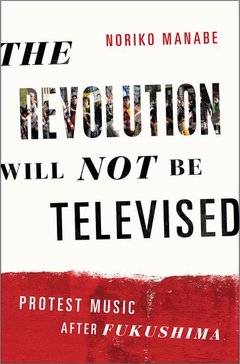The Revolution Will Not Be Televised Protest Music After Fukushima
Langue : Anglais
Auteur : Manabe Noriko

Nuclear power has been a contentious issue in Japan since the 1950s, and in the aftermath of the Fukushima nuclear power plant disaster, the conflict has only grown. Government agencies and the nuclear industry continue to push a nuclear agenda, while the mainstream media adheres to the official line that nuclear power is Japan's future. Public debate about nuclear energy is strongly discouraged. Nevertheless, antinuclear activism has swelled into one of the most popular and passionate movements in Japan, leading to a powerful wave of protest music. The Revolution Will Not Be Televised: Protest Music After Fukushima shows that music played a central role in expressing antinuclear sentiments and mobilizing political resistance in Japan. Combining musical analysis with ethnographic participation, author Noriko Manabe offers an innovative typology of the spaces central to the performance of protest music--cyberspace, demonstrations, festivals, and recordings. She argues that these four spaces encourage different modes of participation and methods of political messaging. The openness, mobile accessibility, and potential anonymity of cyberspace have allowed musicians to directly challenge the ethos of silence that permeated Japanese culture post-Fukushima. Moving from cyberspace to real space, Manabe shows how the performance and reception of music played at public demonstrations are shaped by the urban geographies of Japanese cities. While short on open public space, urban centers in Japan offer protesters a wide range of governmental and commercial spaces in which to demonstrate, with activist musicians tailoring their performances to the particular landscapes and soundscapes of each. Music festivals are a space apart from everyday life, encouraging musicians and audience members to freely engage in political expression through informative and immersive performances. Conversely, Japanese record companies and producers discourage major-label musicians from expressing political views in recordings, forcing antinuclear musicians to express dissent indirectly: through allegories, metaphors, and metonyms. The first book on Japan's antinuclear music, The Revolution Will Not Be Televised provides a compelling new perspective on the role of music in political movements.
Noriko Manabe is Assistant Professor of Music at Princeton University. She has been conducting field research on the Japanese antinuclear movement since 2011 and on Japanese hip-hop, reggae, and EDM scenes since 2005. She was previously a ranked analyst researching the internet, media, and videogame industries at JP Morgan in Tokyo. She holds a PhD in Music from CUNY Graduate Center with concentrations in ethnomusicology and music theory.
Date de parution : 01-2016
Ouvrage de 464 p.
23.6x15.5 cm
Date de parution : 01-2016
Ouvrage de 454 p.
15.7x23.6 cm
Thèmes de The Revolution Will Not Be Televised :
© 2024 LAVOISIER S.A.S.
